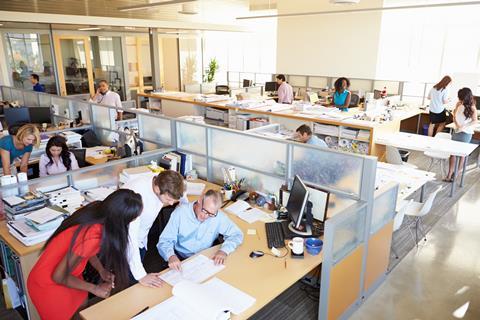Report predicts raft of changes will need to be made to meet social distancing protocols
The demise of hot desking and the energence of unisex superloos are set to be some of the consequences for the office once people begin to start going back to work, a new report by the British Council for Offices has said.
Written by the BCO’s technical affairs committee, a group of industry experts, the paper predicted “desk sharing is likely to become very unpopular” – and will only remain acceptable if desks are frequently and intensely cleaned.

The four-page briefing note says offices will have to stress the importance of hygiene and the need to adhere to social distancing whilst the virus is still active within society.
The paper also speculates on the introduction of tech-based solutions such as apps for location-based reminders to use hand sanitiser, wash hands or to clean desks and laptops.
Neil Pennell, chair of the BCO committee and head of design and innovation at Landsec, said: “Covid-19 has had a significant impact on how we work. While we do not know when we will all be back in the workplace, it’s important to start planning ahead.
“Adaptations can ensure that the risk of virus transmission is reduced and can accommodate our new reality, enabling us all to gain the real benefits that come from working in an office while ensuring we are safe.”
Among those contributing to the report were Peter Williams, technical adviser at Stanhope, Jason McColl a partner at Make Architects and construction lawyer and partner at London law firm Wedlake Bell, Helen Garthwaite.
What the country’s offices might include in the future
- The introduction of screens to protect receptionists from potentially virus carrying visitors
- The replacement of gendered communal toilets with pod-based ‘superloos’ that feature touchless doors, taps and soap dispensers

- An increase in bike storage, with workers likely to ditch public transport’s commuter crowds in favour of cycling
- Limits on the number of people that can occupy a space, use a meeting room or share a lift at any one time
- An end to communal cutlery, coffee pots and water bottles
- The adoption of ventilation and humidification systems which create environments that make transmission tough for viruses



























1 Readers' comment